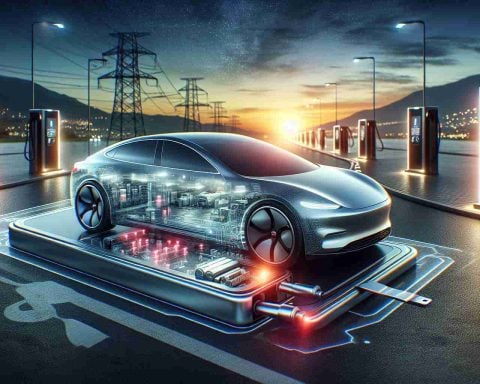“`html
- Nissan halts merger talks with Honda, focusing on independent growth in the EV sector.
- The decision highlights Nissan’s commitment to agility and software-driven vehicle innovation.
- Foxconn emerges as a potential partner, possibly by acquiring a stake from Renault, blending tech expertise with automotive experience.
- Nissan faces significant industry challenges, including plans to reduce production and job cuts.
- Partnership with Foxconn may boost Nissan’s pursuit of technology-integrated vehicle production.
- Potential collaboration aims to combine technological advancements with Nissan’s automotive heritage.
“`
Nissan has hit the brakes on its merger talks with Honda, opting instead for a daring solo journey to reclaim its position in the dynamic electric vehicle (EV) sector. This surprising shift has sent ripples through the automotive industry, as Nissan eyes new ventures that promise to change the landscape of vehicle production.
By choosing to detour from a merger that risked making it a subsidiary, Nissan is prioritizing independence and agility as it navigates the high-speed world of software-driven vehicles. The decision underscores Nissan’s strategy to steer its own course—especially critical in an era where traditional car-making is giving way to technology-infused vehicles.
In the wake of this split, Foxconn stands out as a potential game-changer for Nissan’s EV aspirations. Known primarily for its role in manufacturing Apple products, Foxconn has signaled interest in deepening its automotive endeavors, possibly by acquiring a stake in Nissan from Renault. Such a partnership could fuse Nissan’s automotive legacy with Foxconn’s tech prowess, potentially revolutionizing EV production.
Amidst whispers of reducing global production by 20% and cutting 9,000 jobs, Nissan finds itself at a crossroads. The ink is barely dry on its earnings report, prompting urgent steps toward innovation and resilience in the face of mounting industry pressures. Could Foxconn be the ally Nissan needs to navigate the ever-evolving EV market?
Nissan’s pivot suggests a promising avenue: the possibility of marrying cutting-edge technology with automotive excellence, a move that could redefine the industry’s future. Stay tuned as this unfolding alliance might just accelerate Nissan’s drive into the EV frontier.
Nissan’s Bold EV Strategy: Breaking Ties and Forging New Alliances
Nissan’s Independence: A Strategic Move or a Gamble?
Nissan’s decision to pause its merger talks with Honda reflects a larger strategy aimed at maintaining independence while reclaiming its stature in the electric vehicle (EV) sector. As the automotive industry shifts towards technology-driven vehicles, Nissan’s choice to go solo allows it to focus on innovation and agility. This move prompts the question: Is it a strategic move, or a calculated risk in an intensely competitive market?
# Market Forecasts and Predictions
Nissan’s plans hinge on reducing production costs and enhancing technological capabilities to compete with industry giants like Tesla and Volkswagen. Market analysts suggest that Nissan’s shift may substantially alter its growth trajectory, potentially boosting its market share. By focusing on cutting-edge software and EV innovation, Nissan aims to capture a significant slice of the burgeoning EV market, predicted to reach over $800 billion by 2027.
How Could a Partnership with Foxconn Transform Nissan?
Foxconn, renowned for its manufacturing expertise with tech giants like Apple, is exploring deeper forays into the automobile sector. A partnership with Foxconn could furnish Nissan with unparalleled tech integration capabilities and manufacturing efficiency, transforming its EV production line. But how viable is this partnership, and what would the implications be?
# Innovations and Features
Collaborating with Foxconn could introduce innovations such as advanced battery technology, improved user interfaces, and enhanced connectivity in Nissan’s EV lineup. This partnership might set new benchmarks in the industry by integrating smart technology and automotive engineering. The collaboration could enable Nissan to rapidly develop high-performing EV models while keeping production costs competitive.
What Are the Risks and Limitations in Nissan’s Current Strategy?
While Nissan anticipates opportunities through its potential partnership with Foxconn, there are inherent risks and limitations in straying from traditional automotive paths. Can Nissan overcome these challenges to achieve its ambitious goals?
# Limitations and Security Aspects
Key limitations include navigating economic uncertainties and the possibility of adverse market reactions to their new direction. Moreover, unlike its traditional competitors, Nissan must emphasize bolstering cybersecurity measures, given the tech-centric nature of future automotive models. Safeguarding user data and vehicle systems from potential breaches is paramount in ensuring customer trust and product integrity.
Suggested Related Links
Nissan’s quest to redefine its future in the EV market is intriguing and complex. Whether through innovative partnerships or independent initiatives, Nissan’s evolution could significantly impact the global automotive landscape.


















